The riveting new documentary ‘Black Ice‘ examines the story and experience of Black hockey players as told by past and current players. Directed by Hubert Davis (‘Giants of Africa’) and produced by Vinay Virami, the film will exclusively be released in AMC Theaters on July 14, 2023.
What Is The Plot Of ‘Black Ice’?
The award-winning documentary explores the history of racism in hockey as told by past and present Black hockey players. The film also goes deep into the history of the game, all the way back to the Colored Hockey League of the Maritimes (CHL) and the origin of the Slapshot. It features players such as Willie O’Ree, who was the first Black NHL hockey player, and Akim Liu, who was the first to publicly break silence about the pattern of racism in the sport.
“History is on the ice.”
This incisive, urgent documentary examines the history of anti-Black racism in hockey, from the segregated leagues of the 19th century to today’s NHL, where Black… Read the Plot
Who Is Featured In ‘Black Ice’?
‘Black Ice’ features many hockey players, past and current, including the first Black NHL hockey player Willie O’Ree. The documentary also features Akim Aliu, P.K. Subban, Wayne Simmons, Matt Dumba, Anthony Duclair, Saroya Tinker, Sarah Nurse, and Mark Connor.
ECinema News recently had the pleasure of speaking with Hubert Davis about his latest documentary, what drew him to the project, how his own experience in sports helped him in telling this story, and what he hopes this film will provide for the future generation of Black hockey players.
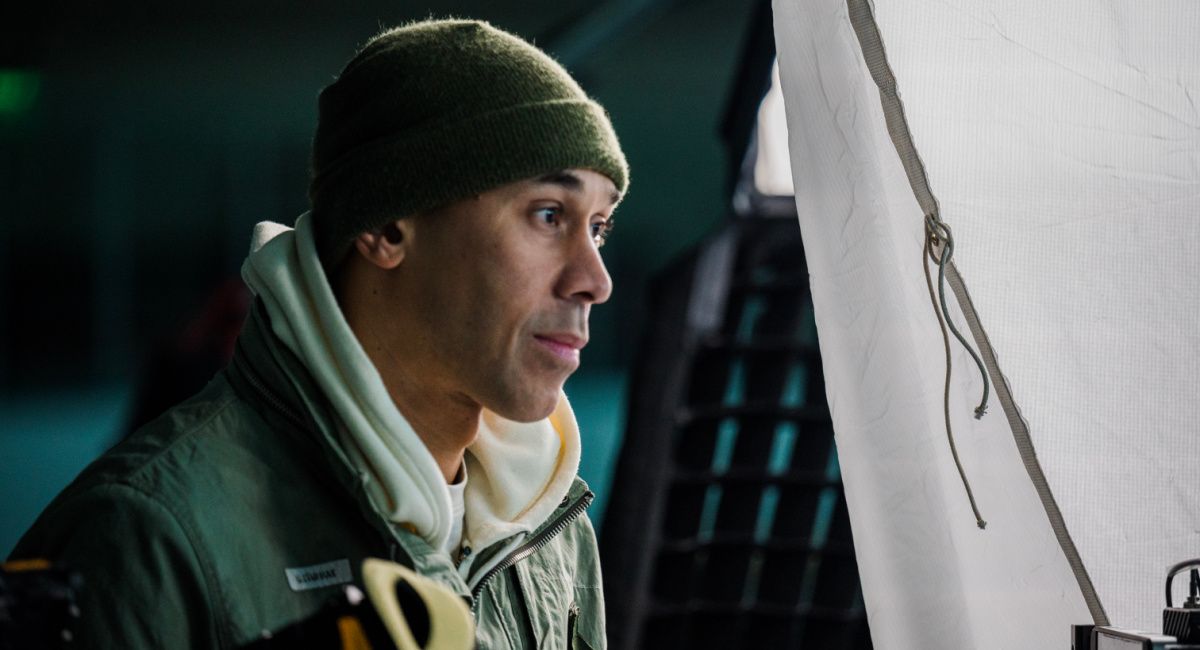
Director Hubert Davis on the set of ‘Black Ice.’ Courtesy of Roadside Attractions.
You can read the full interview below or click on the video player above to watch the video.
ECinema News: To begin with, what was it that drew you as a filmmaker to direct ‘Black Ice’?
Hubert Davis: I think I saw in ‘Black Ice’ an opportunity to kind of do two things. One, talk about this, uncover this history of the Colored Hockey League and the kind of origin stories of hockey and the Black experience in it. Then the second part was to really talk about the current Black experience in hockey. Through talking about that experience, we could talk about bigger issues, we could talk about how systemic racism actually works that had to do with hockey but had to do with also just the world. I thought it was a really interesting avenue to talk about some of those issues.
MF: Systemic racism, especially in sports, it’s not a new thing. But this story, the story you told about racism in the sport of hockey, it’s not as widely known or talked about as it is in other sports. Why do you think that is?
HD: Well, I think what I learned is that hockey itself is quite closed as a sport, and I felt that even early on in the process of making the documentary. So some of the interviews, some of the conversations I had, it was quite a bit almost like, you were doing a story on the mafia. It was that kind of like, if you’re inside of this space then we are free to talk. If you are coming from outside of the space, we don’t break that silence. So I thought actually that in itself was interesting for a documentary to cover of a topic and a sport itself that is quite closed off and they don’t let outsiders in. So, if we could crack it, if we could actually crack it and talk about some of these issues, I thought it would be interesting because we don’t often get to hear those stories.
Related Article: Robert Englund Talks ‘Hollywood Dreams & Nightmares: The Robert Englund Story’
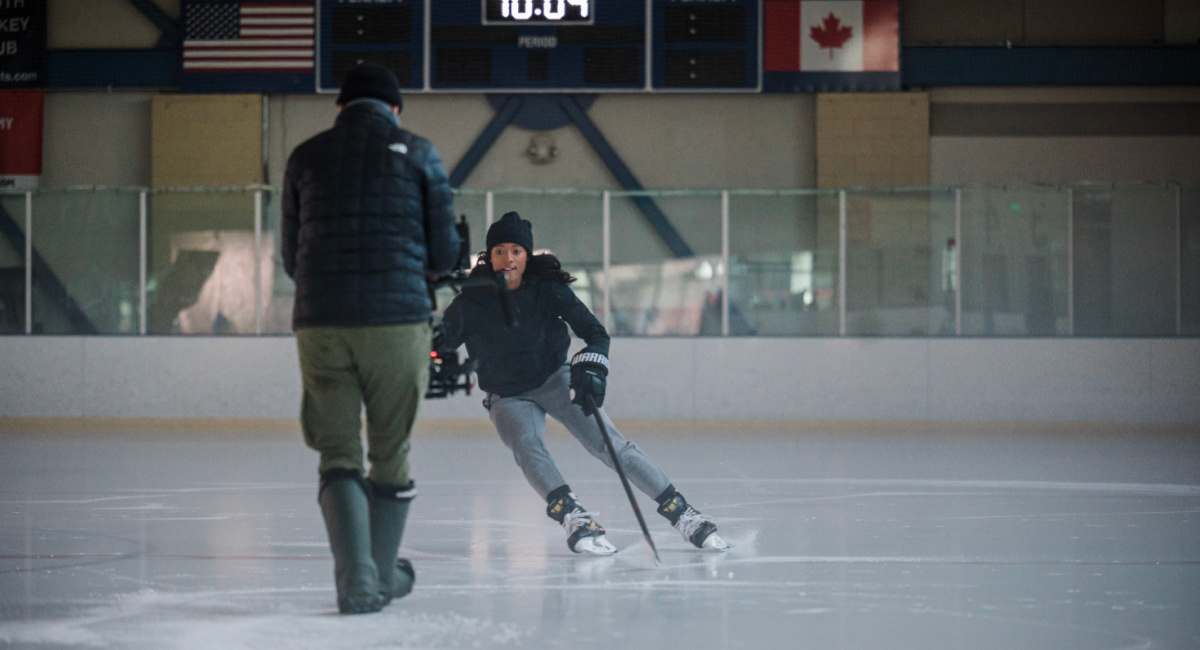
Blake Bolden in director Hubert Davis’ ‘Black Ice.’ Courtesy of Roadside Attractions.
MF: What are you hoping this film will do for the future generation of Black hockey players and just the sport in general?
HD: Yeah, I think that including Mark’s story was super important to me because it was current, because it was happening as we were filming they were still investigating the incidents that had happened to him. I thought that was so important to include that, we’re not talking about the past, we’re talking about right now. These incidents are happening. So I think everyone agreed to be in the film ultimately because they wanted to make a smoother pathway for young people in the sport. They wanted those experiences that they have gone through to not happen or not happen as frequently to people who were coming in. So I think that was why they did it, quite honestly, I think that’s why they came forward trying to make some meaningful change. Again, that was my hope for the documentary as well.
MF: One of the athletes that you interviewed, Akim Aliu, spoke about his experience and in watching him recount that, it seemed to reopened and trigger a lot of trauma for him again. For you, having a similar experience in basketball, what was it like to watch him process that through his interview for this documentary and what was it like for you relating that to your own experience?
HD: Well, I think it was interesting for me because I think any Black person has had an experience of overt racism in their lives at some point. So I think why Akim is so important, and important in the story, is because he’s the first person to really say it publicly in hockey, in his context of the hockey world. So that really opened doors then for other players to feel like they could talk about it and also that they would be asked about it. So it kind of opened this door for the conversation that hadn’t really happened before. I think even though it was hard to ask people to go to those places, naturally to make them uncomfortable, which makes the viewer uncomfortable in hearing those stories. But I do think that’s why we have to do it and that’s why the documentary had to hit hard in places where it needed to. Because if you’re not really going to talk about it and get it out there, then there always seems to be an excuse. A kind of, “oh, well it was just this person and this person,” it’s that, as opposed to looking and realizing, “No, these are all connected” because all of these stories are happening, and they’re happening all over the place. So what’s the bigger issue that we have to look at as opposed to the individual ones?
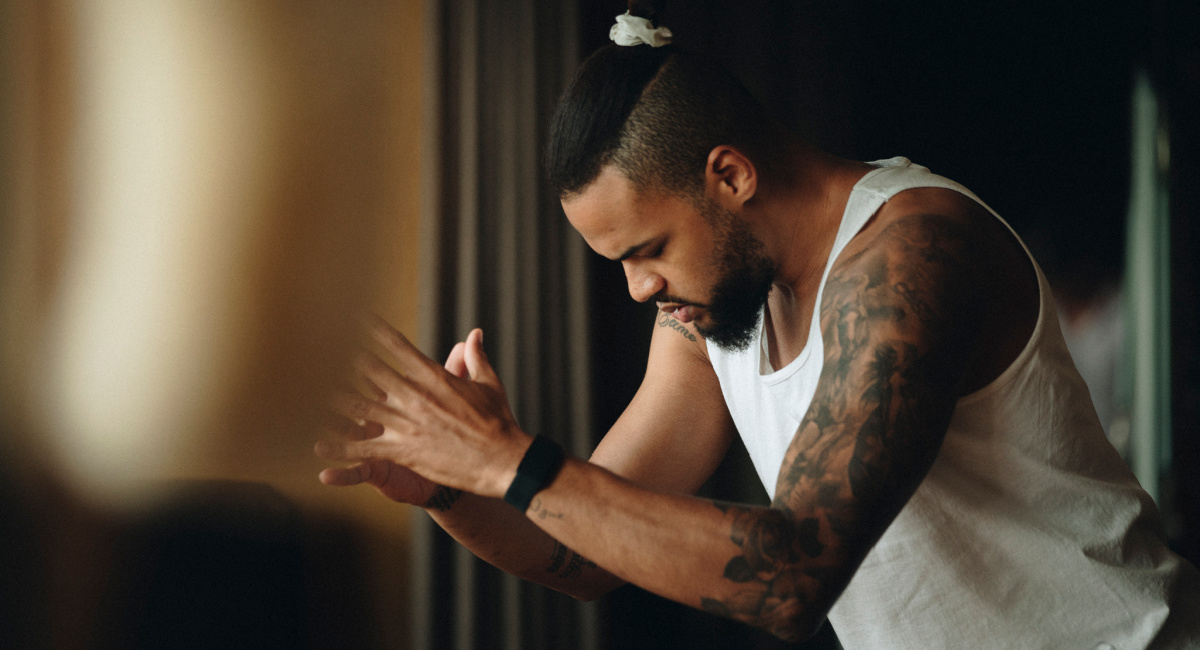
Akim Aliu in director Hubert Davis’ ‘Black Ice.’ Courtesy of Roadside Attractions.
MF: You have so much experience in directing documentaries like ‘Hardwood,’ and ‘Giants of Africa.’ So combining that with your experience in sports, specifically basketball, how did that help you in directing this documentary?
HD: I think my involvement in sports is interesting because I think I understand sports is a great way to have conversations. Sports is such a thing that we fall on, it’s like talking about the weather, it’s something that bonds us, so we can talk about it and we can connect on how the team is doing, even if we don’t know that much, or we know a lot, or we know a little, as human beings it’s a common language. So I think that was so important for this. I understood that all these players had such a deep love for the sport. For a lot of them that’s given them their identity, it’s given them their livelihood, it’s allowed them to meet friends and family, and all of that all rotates around sport. So I did understand that it was at its heart a love story. That’s why we start with them recounting their memories of first skating or their first game because if they didn’t love it then they wouldn’t have put up with what they put up with to get to the other side. I thought that was really interesting. The thing that you love that doesn’t always love you back and I thought I could understand that and I thought that was an interesting thing to explore.
MF: The film also talks about a lot of amazing history having to do with hockey, including the Black Hockey League of Nova Scotia, and who originated the slapshot, which I think the general audience wouldn’t know about until they watch the film. Was there a piece of history or something from an athlete’s story that surprised you the most?
HD: Well, the league itself, actually I didn’t know about it before this project came to me, I didn’t know the Colored Hockey League even existed. Then I think what I was surprised at is that the idea that Black experience in hockey actually is kind of like a through line, it never stopped. There was always actually a Black contribution to the sport of hockey from the Colored Hockey League all the way to today. It never really stopped. I thought that was interesting. Sometimes it’s like it’s just underneath, you’ve got to kind of pull things away to find it. But once you find the spine of it and you talk to more people, they’d be like, “Oh, have you talked to this guy?” Or “Did you know about this guy?” Unfortunately we couldn’t include all those stories, but you really feel it when you start to research that there is this experience that has always been there.
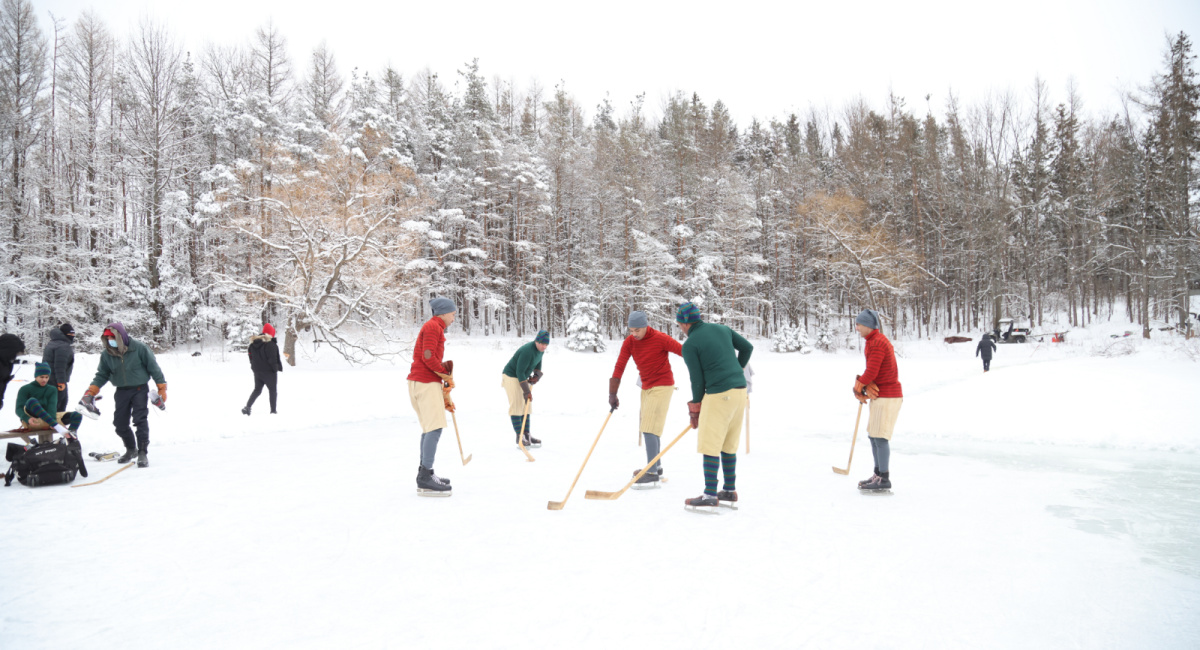
Scene from director Hubert Davis’ ‘Black Ice.’ Courtesy of Roadside Attractions.
ECinema News: This is a Canadian story, as hockey originated in Canada, so there’s a lot of gorgeous imagery that you incorporated into the film and in the way you framed and lit the athletes in their interviews, which gave it a moodier tone. What was it that inspired those choices and the style for this film?
HD: I wanted there to be two parts to it. I think the interviews themselves were very much reflecting that they are, a lot of times, isolated so they’re the only person of color on their team and there’s this idea of being in this big open space that they’re alone. But then I also wanted the images of the actual playing to be really beautiful and there’s this kind of movement. We shot so much hockey, street hockey in Venice Beach, California, and we shot on the East Coast. In every city we try to find and see those players that are playing today. So you have this connection to the idea of how beautiful the sport is, and yet with this beauty comes this other side of it, and so the duality of that experience.
MF: As previously mentioned, hockey is a Canadian sport. The athletes that are featured in this movie are Canadian. How did it feel to have this film premiere at the Toronto International Film Festival?
HD: It was amazing. We were really working towards that as our first and biggest screening. It just felt like it was the right place for it. It felt like it was the right time. A lot of the players are Canadian, so even though they play in the US and play on different teams all over the place, they all kind of came back and brought their families in. It was a great moment just to have them all up on stage and for them to be celebrated and feel united in their story and their contribution was really amazing. So, I was so proud of that moment and being a part of it.
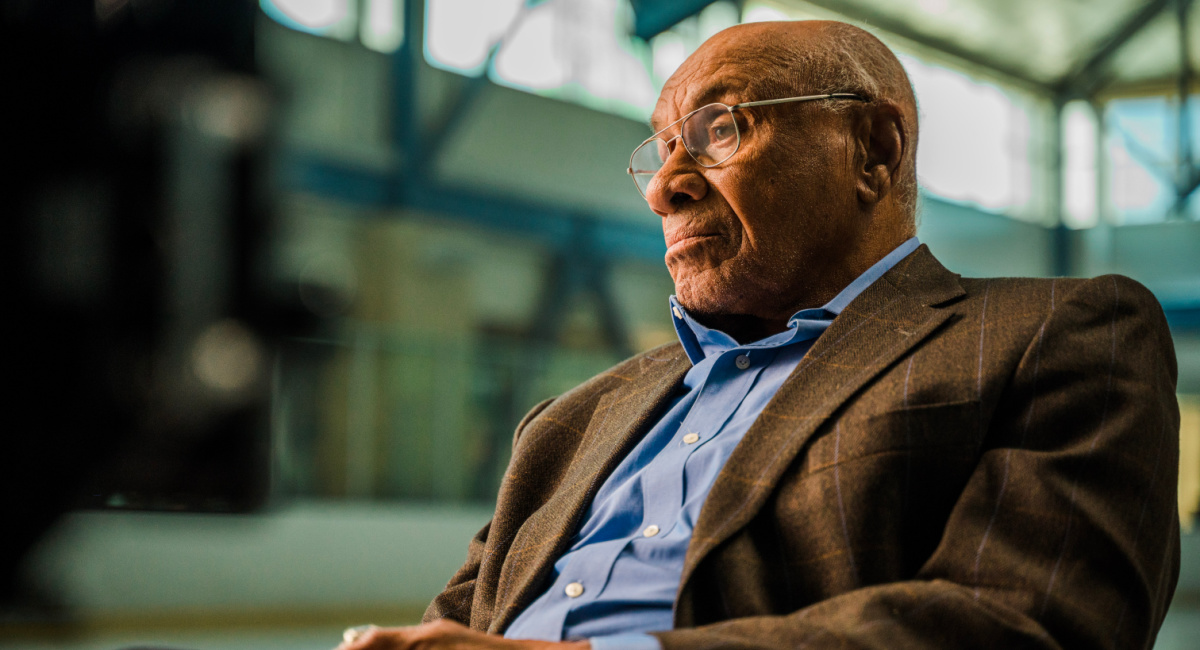
Willie O’Ree in director Hubert Davis’ ‘Black Ice.’ Courtesy of Roadside Attractions.
MF: What do you hope people will take away from this movie?
HD: I mean, I hope that in going to the theater and seeing it, some people see themselves. I think I saw myself in this story and understood the deep-rooted origins of Black history is in so many places that we don’t get a chance to see or celebrate. So there’s that part of it. Then I’m hoping for younger people who are going into the spaces that they see themselves and see other people standing up, and other people that they look up to in those spaces. Then the third part is I hope that it inspires some change. I think organizational change, community change to try and again, make those spaces better than where they’ve been.
MF: Finally, what project are you working on next? Will you make another documentary?
HD: I’m working on a narrative feature next, out of the documentary realm. I think, telling stories about community, about change, about things we don’t see in the world, I think that’ll always be close to my heart of wanting to put that out in the world. But yeah, I’ll always come back to documentaries because it’s close to my heart and I think I’ve made a career out of it. It’s hard to replicate that, I think, in a way. It’s so rewarding because you get to go in, talk to people, connect with people and you’re always learning. So I think that’s kind of what keeps you inspired to keep going. But yeah, I think getting to do something in a narrative space up next will be a new challenge and something fun.
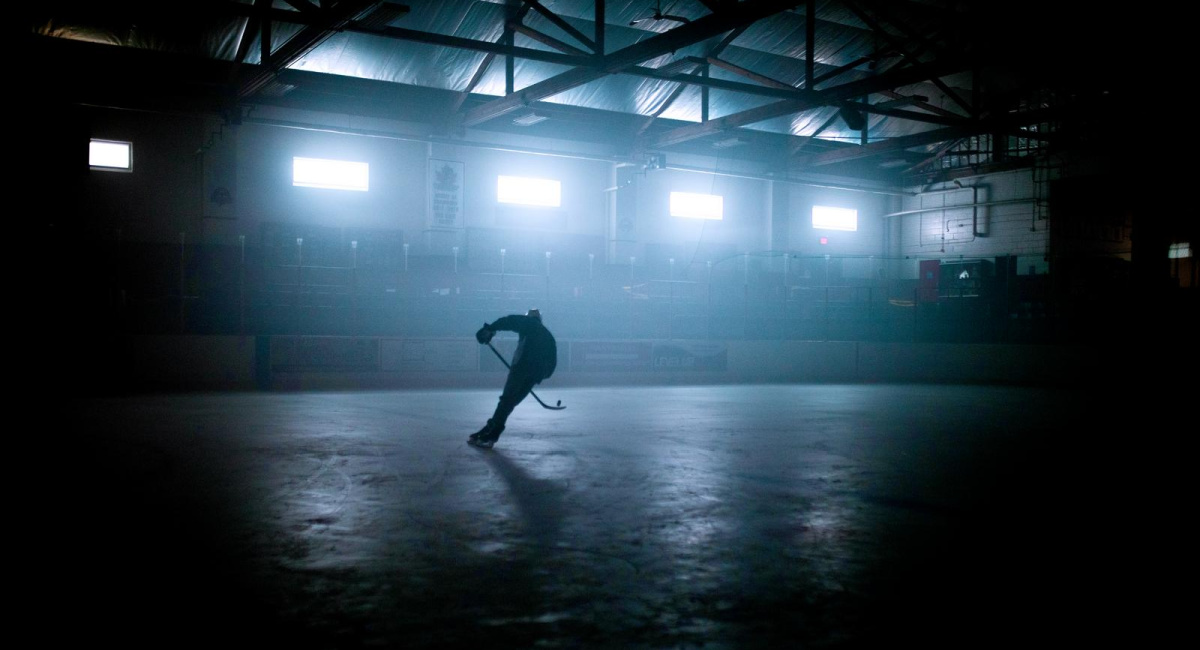
Scene from director Hubert Davis’ ‘Black Ice.’ Courtesy of Roadside Attractions.
Other Movies Similar to ‘Black Ice’:
Buy Hockey Documentaries On Amazon
‘Black Ice’ is produced by Uninterrupted, Elevation Pictures, Bell Media Studios, and Crave. It is scheduled to release exclusively in AMC Theaters on July 14, 2023.
Content Source: www.moviefone.com

